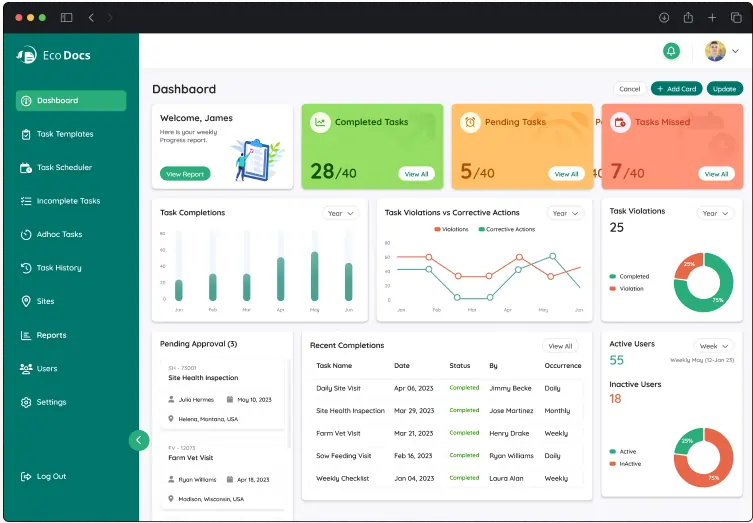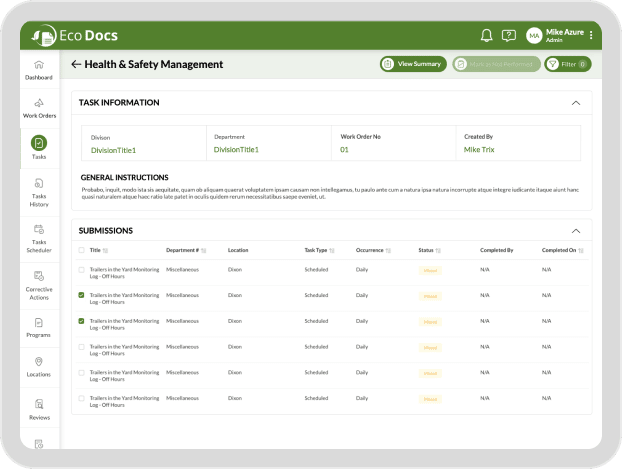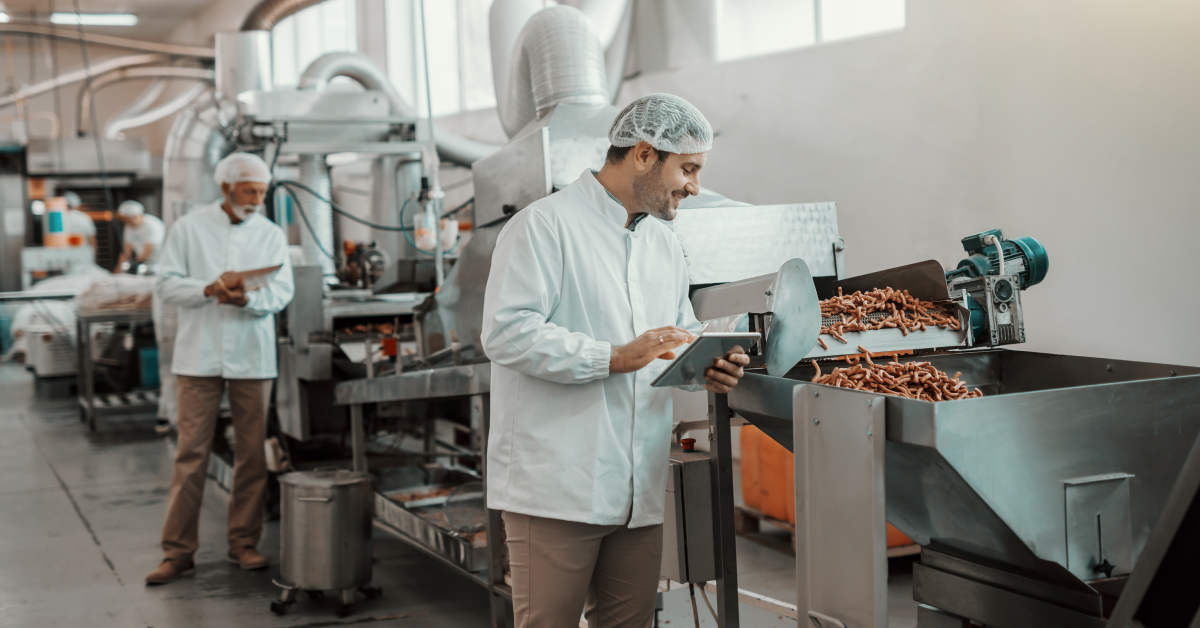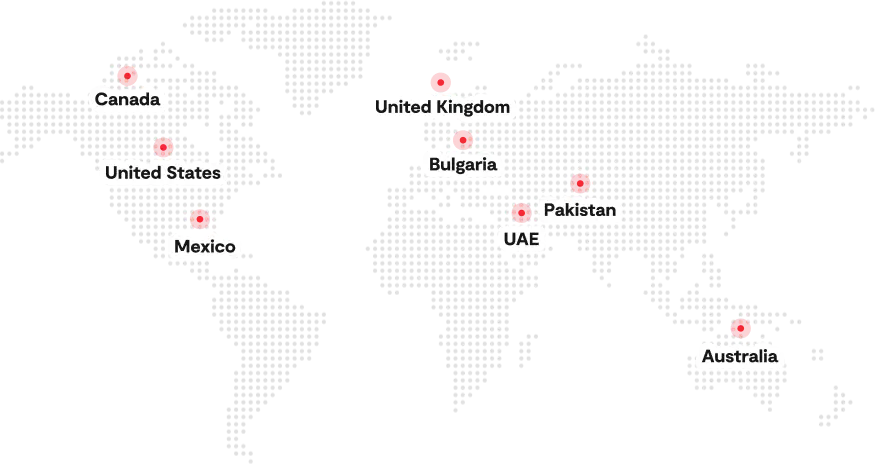The need for digital transformation in food safety has become more urgent due to globalization, complex supply chains, and rising concerns about foodborne illnesses. As companies face increasing pressure to comply with regulations like FSMA (Food Safety Modernization Act), HACCP (Hazard Analysis Critical Control Points), and GFSI (Global Food Safety Initiative), adopting digital solutions becomes a strategic necessity.
Here, we’ll explore the driving factors behind digital food safety, common challenges, and how Folio3 FoodTech’s Food Safety Software helps overcome these barriers.
The Growing Need for Digital Food Safety
The food industry has seen significant changes over the past few decades, with globalization expanding supply chains and increasing the risks associated with food safety. In 2023, the World Health Organization reported an estimated 600 million cases of foodborne illnesses globally, highlighting the ongoing threat to public health.
Additionally, the rising number of recalls due to contamination and mislabeling has made compliance a critical priority for food companies. Introducing stricter regulations such as FSMA in the U.S. and GFSI guidelines globally requires companies to maintain high standards in monitoring and reporting.
Digital transformation in food safety offers solutions for streamlining data access, enabling faster decision-making, and ensuring compliance with industry standards. Folio3 FoodTech’s Food Safety Software is at the forefront of this shift, offering advanced tools to enhance safety protocols and optimize quality management.
Key Drivers of Digital Transformation in Food Safety
The shift towards digital food safety is driven by several critical factors that are reshaping the industry. With the growing complexity of global supply chains, stringent regulatory requirements, and evolving consumer expectations for transparency, companies are under increasing pressure to adopt advanced technologies.
These drivers highlight the urgent need for real-time data management, streamlined food safety compliance, and proactive risk mitigation, making digital transformation essential for maintaining food quality and safety standards.
1. Data Management Needs
With large volumes of data generated across various supply chain stages, managing and analyzing this information in real time is essential. Digital food safety solutions provide centralized platforms that promptly collect, process, and analyze data to identify food safety hazards.
2. Globalization of the Food Supply Chain
Global trade introduces challenges such as managing diverse suppliers and ensuring consistent safety standards. As the complexity of the supply chain grows, digital food safety solutions help track food safety incidents across borders.
3. Regulatory Pressures
The requirements for continuous monitoring and real-time reporting under FSMA 204 and GFSI emphasize the need for digitalization in the food industry. Companies must adhere to stringent documentation processes to ensure compliance, making digital tools invaluable.
4. Consumer Expectations for Transparency
Consumers today demand transparency about the origins of their food, the safety measures involved, and quality standards. Digitization enables companies to provide detailed insights, meeting consumer demands while building trust.
Major Challenges in Adopting Digital Food Safety Solutions
While digital transformation in food safety has significant benefits, companies often face several hurdles in the adoption process.
Transitioning from traditional methods to automated systems presents challenges, such as integrating new technologies with legacy infrastructure, ensuring data security, managing costs, and overcoming resistance to change within the organization.
Addressing these challenges is crucial for companies to fully realize the potential of digital food safety solutions as they strive to enhance operational efficiency, ensure regulatory compliance, and protect consumer health.
1. Integration with Legacy Systems
Switching from traditional methods to digital platforms can be daunting, especially for businesses reliant on legacy systems. Integration challenges often arise when attempting to synchronize new technology with existing infrastructure. Legacy system modernization becomes essential in these cases to ensure compatibility, improve efficiency, and reduce long-term maintenance costs.
2. Data Privacy and Security Concerns
As food safety becomes more data-centric, protecting sensitive information across global supply chains is paramount. Ensuring data privacy, secure storage, and compliance with regulations like GDPR is complex.
3. Cost and Resource Allocation
The initial investment in digital food safety technology, training staff, and implementation can be high. Allocating resources for these upgrades presents a significant hurdle for smaller companies.
4. Resistance to Change
Long-standing practices can result in cultural resistance to digital adoption. Employees accustomed to manual processes may hesitate to embrace automated workflows.
Benefits of Digitizing Food Safety and Quality Processes
Digitizing food safety and quality processes offers a range of advantages that go beyond traditional methods. Automation and digital tools streamline tasks such as:
Efficiency & Productivity Gains
Digital transformation streamlines food safety processes by automating monitoring, auditing, and compliance reporting. Businesses can make quicker decisions based on real-time insights with less manual effort.
For instance, automated alerts can notify food quality control teams immediately when a potential issue is detected, reducing response times and minimizing risks. Digitization frees up resources, allowing teams to focus on strategic tasks instead of manual data entry or paperwork.
Traceability & Transparency
Real-time data access enhances traceability throughout the food supply chain, from raw materials to finished products. With digital platforms, companies can quickly trace contamination sources and take corrective actions to prevent wider distribution of affected products.
Enhanced transparency also helps meet consumer demands for information on food products’ origin and safety measures, building trust and supporting brand reputation.
Predictive Analytics
By integrating AI and IoT technologies, companies can utilize predictive maintenance and identify risks before they escalate. For example, IoT sensors can monitor temperature and humidity levels in storage facilities to detect any anomalies that could compromise product quality.
Predictive analytics allow businesses to act proactively, maintaining high safety standards while reducing waste and operational costs. Folio3’s Food Safety Software includes predictive tools that help identify potential risks and optimize safety protocols.
Regulatory Compliance Made Easy
Meeting industry standards such as FSMA, HACCP, and GFSI can be challenging, mainly when relying on manual documentation. Digital transformation simplifies this process by automating compliance tasks, including data logging, audit preparation, and reporting, and by incorporating security compliance services that ensure all digital records meet regulatory and cybersecurity standards.
Automated systems ensure that compliance requirements are consistently met, reducing the risk of penalties and facilitating smoother audits. This level of automation helps businesses stay ahead of regulatory demands while maintaining operational efficiency.
How Folio3 FoodTech Helps Overcome Challenges in Digital Transformation?

Following are the capabilities that position Folio3 FoodTech as a trusted partner for businesses seeking to modernize their food safety practices through digital transformation:
Seamless Integration with Existing Systems
Transitioning from traditional methods to digital food safety management systems can be daunting, especially when dealing with legacy infrastructure. Folio3 FoodTech addresses this challenge by offering solutions that integrate smoothly with existing food ERP systems, supply chain management tools, and legacy technologies.
This approach minimizes disruptions and ensures a more manageable shift towards digitalization, allowing companies to adopt advanced food safety practices without overhauling their entire infrastructure.
Real-Time Data Access and Analytics
With Folio3’s 24/7 monitoring capabilities, food companies can continuously monitor safety metrics, operational conditions, and quality parameters.
The software allows businesses to react promptly to safety concerns, using data-driven insights to guide preventive actions. Real-time analytics also support continuous improvement initiatives by providing actionable insights that can be used to optimize processes and enhance overall food safety.
Customizable Solutions
The needs of food safety management vary significantly across different sectors, such as meat processing, dairy production, and packaged foods. Folio3 FoodTech offers tailored food traceability solutions designed to meet the specific requirements of each industry.
The software’s customizable nature ensures that companies can address their unique challenges—whether managing cold storage conditions in dairy or ensuring contamination control in meat processing—thereby maximizing the effectiveness of their digital food safety initiatives.
Enhanced Traceability and Reporting
Maintaining detailed and accurate records is essential for enhanced food traceability and compliance with food safety regulations. Folio3’s software incorporates features such as blockchain integration, enabling companies to automate record-keeping while ensuring the data is secure and tamper-proof.
This automation simplifies compliance with industry standards like FSMA, HACCP, and GFSI, providing a transparent and easily accessible history of every safety action. The ability to quickly generate reports and access historical data also streamlines the audit process, reducing the administrative burden.
Training and Support Services
Adopting new technologies can be challenging for staff accustomed to manual processes. Folio3 FoodTech provides continuous training and support services to facilitate a smooth implementation.
The training programs are designed to upskill employees on the new systems, while ongoing support ensures any challenges encountered during the transition can be resolved swiftly. This comprehensive approach helps organizations build a robust digital culture, accelerating the company’s adoption of digital food safety solutions.
Case Study of Successful Digital Transformation in Food Safety
Real-world examples demonstrate the powerful impact of digital food safety management systems. The following case study of a leading lamb processing plant showcases how Folio3 FoodTech has helped companies achieve food safety excellence.
A Leading Lamb Processing Plant

A renowned leader in the meatpacking industry, this company partners with over 1,000 family ranches. To enhance food safety and streamline operations, Folio3 FoodTech introduced several digital solutions:
- Digitization and Automation
The plant’s outdated paper-based system was replaced by EcoDocs, a digital platform that automated tasks such as data collection, food safety inspection scheduling, and report generation. This transition reduced manual errors, saved time, and improved operational efficiency.
- Enhanced Compliance with Regulations
EcoDocs provided pre-built templates and checklists aligned with FSIS standards, ensuring the plant complied with regulations like HACCP & CCP requirements. The custom FSIS compliance management software minimized the risk of regulatory violations.
- Increased Transparency and Data-Driven Decision-Making
The platform’s real-time dashboards and analytics enabled the plant to monitor food safety performance across all locations, quickly identifying and addressing potential issues.
The Future of Digital Food Safety
Cutting-edge technologies such as AI, IoT, and blockchain are set to revolutionize the future of food safety. These advancements are transforming how food safety is monitored, managed, and improved, making it possible to prevent issues before they occur and ensure higher levels of transparency throughout the supply chain.
Predictive analytics and automation will enable companies to address risks proactively, while blockchain technology will provide immutable records for tracking food’s journey from farm to table. As these technologies evolve, they will be pivotal in shaping safer and more efficient food safety practices.
1. AI and IoT in Food Safety
The integration of Artificial Intelligence (AI), Machine Learning (ML), and the Internet of Things (IoT) is set to redefine food safety management. Advanced AI algorithms can identify patterns in data to detect anomalies, predict potential contamination risks, and optimize production processes.
For instance, AI-driven predictive maintenance can detect early signs of equipment failure that could lead to food safety issues, enabling proactive measures. IoT devices, such as smart sensors, can continuously monitor environmental conditions like temperature and humidity, instantly alerting staff if they deviate from safe ranges. This combination of AI and IoT provides a real-time, data-driven approach to food safety, significantly enhancing the ability to monitor, detect, and prevent risks.
2. Blockchain for Traceability
Blockchain technology is poised to transform food traceability by providing a decentralized and tamper-proof ledger for recording every step of the food supply chain management. Each transaction, from farm to fork, can be recorded on a blockchain, offering a transparent and immutable history of the product’s journey.
This technology simplifies compliance with regulatory requirements and boosts consumer confidence by ensuring food authenticity and safety. In the case of a food recall, blockchain allows for rapid identification of the affected batches, minimizing the impact on consumers and businesses.
3. Predictive Analytics and Automation
The future of food safety lies in predictive analytics and automation, where data collected from various sources is analyzed to forecast potential risks before they occur. By utilizing AI-powered predictive models, companies can anticipate problems such as contamination, spoilage, or equipment failure, allowing them to take corrective actions.
Automated systems can also streamline repetitive tasks like monitoring safety metrics, generating compliance reports, and conducting food safety audits. These predictive and computerized capabilities enhance food safety, optimize resource allocation, and reduce operational costs.
Folio3’s Role in the Future
Folio3 FoodTech is at the forefront of incorporating cutting-edge technologies such as AI, IoT, and blockchain as the food safety landscape evolves. Folio3 is developing solutions that leverage AI for real-time data analysis, enabling predictive maintenance and rapid risk detection.
Integrating IoT devices within their software platform allows for continuous monitoring food safety parameters, ensuring businesses maintain high food safety standards. Additionally, Folio3 is exploring blockchain applications for enhancing traceability, making it easier for companies to maintain transparent and compliant records. By staying ahead of technological advancements, Folio3 FoodTech is positioning itself as a leader in driving the digital transformation of food safety.
Conclusion
Using digital transformation in food safety is no longer optional—it’s necessary for businesses striving to meet evolving regulatory standards, ensure product quality, and protect consumers. With AI, IoT, and blockchain advancements, food safety management can become more proactive, transparent, and efficient. Additionally, leveraging food advertisements can help businesses educate consumers about their commitment to high safety standards, build trust, and brand loyalty.
Companies adopting these digital solutions will optimize their operations and build trust through enhanced traceability and predictive capabilities. Folio3 FoodTech plays a crucial role in this transformation, offering tailored solutions that integrate seamlessly with existing systems, empowering businesses to stay ahead in a rapidly changing landscape.
FAQs
What is Digital Food Safety?
Digital food safety involves using technology and data-driven solutions, such as AI, IoT, and blockchain, to monitor, manage, and improve food safety processes. It automates monitoring, compliance reporting, and predictive maintenance to ensure high safety standards.
Why is Digital Transformation Necessary in the Food Industry?
Digital transformation is essential for addressing the growing complexity of food safety due to globalization, supply chain challenges, and regulatory pressures. By leveraging real-time data and advanced analytics, companies can maintain compliance, improve traceability, and enhance efficiency.
How Does AI Improve Food Safety?
AI improves food safety by analyzing data for patterns that indicate potential risks, such as contamination or equipment failure. It enables predictive maintenance, where issues are identified and resolved before they become problems, thus enhancing preventive care.
What Role Does Blockchain Play in Food Safety?
Blockchain provides a transparent and immutable ledger for recording every stage of the food supply chain, enhancing traceability and ensuring compliance. It helps identify and isolate affected batches during recalls, minimizing the impact on consumers and businesses.
How Does Folio3 FoodTech Assist in Digital Food Safety Transformation?
Folio3 FoodTech helps by offering customized digital solutions that integrate with existing systems, providing real-time data monitoring, predictive analytics, and blockchain-based traceability. This enables food businesses to maintain compliance, improve operational efficiency, and enhance safety practices.





